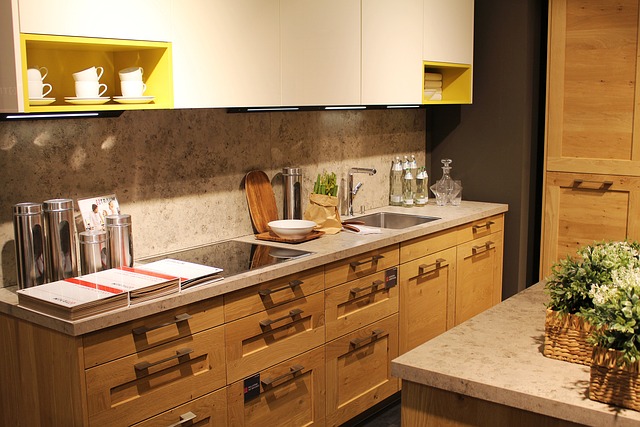In today's conscious consumer landscape, a sustainable kitchen renovation is gaining popularity as people strive for eco-friendly living. Using environmentally friendly materials like bamboo and recycled countertops reduces waste, promotes longevity, and offers unique aesthetics, seamlessly merging sustainability and style. Bamboo's strength, durability, and antibacterial properties make it a leading choice. Recycled countertop materials significantly reduce environmental impact and offer durability and unique textures. Careful design considerations, proper maintenance, and partnering with trusted suppliers are key to successful integration of these sustainable materials in kitchen renovations.
In today’s eco-conscious world, a sustainable kitchen renovation is more than just a trend; it’s a responsible choice. The need for environmentally friendly solutions has never been more pressing. This article explores the shift towards using sustainable materials like bamboo and recycled countertops in kitchen design. We’ll delve into their numerous benefits, from reduced environmental impact to enhanced aesthetics. Learn about integration tips, reliable suppliers, and installation tricks, empowering you to make a positive change with your next kitchen remodel.
Understanding the Need for Sustainable Kitchen Renovations
In today’s world, there’s a growing recognition of the need for more eco-friendly and responsible living, especially in spaces we spend a significant amount of time in, like our kitchens. The concept of a sustainable kitchen renovation is gaining traction as folks become more conscious of the environmental impact of their choices. Traditional kitchen materials often contribute to significant waste and carbon emissions, highlighting the urgent need for alternatives.
A sustainable kitchen renovation involves carefully selecting materials that minimize harm to the environment, reduce waste, and promote longevity. By opting for options like bamboo or recycled countertops, homeowners can make a positive step towards reducing their ecological footprint. These materials offer not only an eco-friendly choice but also contribute to a unique, aesthetically pleasing space, proving that sustainability and style can go hand in hand.
Benefits of Using Bamboo in Kitchen Countertops
Bamboo is emerging as a top choice for those looking to incorporate sustainable elements into their kitchen renovations. This versatile grass is not only aesthetically pleasing but also offers numerous advantages as a countertop material. One of its key benefits is its remarkable strength and durability, making it a durable option that can withstand heavy use in high-traffic areas like kitchens. Unlike traditional stones or solid woods, bamboo countertops are highly resistant to scratches, cracks, and warping, ensuring they retain their beauty over time.
Moreover, bamboo is an incredibly eco-friendly choice for sustainable kitchen renovations. It grows rapidly, making it a renewable resource that can be harvested without depleting the planet’s resources. Bamboo also absorbs more carbon dioxide than many other plants, contributing to better air quality and helping to mitigate climate change. With its natural antibacterial properties, this material further enhances hygiene in food preparation areas, making it an ideal choice for health-conscious homeowners.
Advantages of Recycled Countertop Materials
Recycled countertop materials offer a compelling option for those seeking a more eco-friendly approach to sustainable kitchen renovations. One of the primary advantages is their environmental impact—these materials are made from recycled content, reducing the demand for new raw materials and minimizing waste generation. By choosing recycled countertops, homeowners contribute to a circular economy, where resources are reused and reclaimed.
Additionally, recycled countertop options often exhibit durability and strength, ensuring they can withstand the high-traffic areas of a kitchen. They provide an aesthetically pleasing alternative to conventional materials, with unique textures and patterns that add character to any space. Moreover, their production typically involves less energy consumption and lower greenhouse gas emissions compared to traditional countertops, aligning perfectly with the goals of eco-conscious consumers in their sustainable kitchen renovation endeavors.
Integration and Design Considerations for Sustainable Countertops
When integrating sustainable materials like bamboo or recycled countertops into a kitchen renovation, design considerations are key to creating an aesthetically pleasing and functional space. It’s essential to think about how these materials can complement existing design elements while ensuring they serve the desired purposes. For example, bamboo countertops offer a unique natural beauty that can enhance modern minimalist kitchens, while recycled glass or metal countertops add a touch of eco-friendly elegance to more traditional designs.
Furthermore, practical integration involves understanding the care and maintenance requirements of these sustainable materials. Bamboo, for instance, requires regular sealing to prevent water damage, whereas recycled countertops often have a durable, low-maintenance finish. Proper planning and research can ensure that these materials not only fit seamlessly into the overall design but also stand the test of time, contributing to both the beauty and sustainability of your kitchen renovation.
Finding Reliable Suppliers and Installation Tips
When considering a sustainable kitchen renovation, finding reliable suppliers and skilled installers who share your commitment to eco-friendly practices is essential. Start by researching local businesses specializing in sustainable materials; many offer a wide range of options, from bamboo flooring to recycled countertops. Online marketplaces and supplier directories can be useful tools for identifying reputable sources. Check reviews, inquire about certifications, and ensure the suppliers are committed to ethical sourcing and responsible manufacturing processes.
During installation, clear communication with your contractor is vital. Discuss the specific requirements for each material, including any necessary preparation or finishing touches. Proper measurement and cutting techniques are crucial to ensuring a seamless fit. For instance, recycled countertops may require specialized care due to their unique properties. A skilled installer will understand these nuances, guaranteeing a durable and aesthetically pleasing finish that complements your sustainable kitchen renovation goals.
In light of the growing importance of sustainable living, embracing eco-friendly practices in kitchen renovations is not just a trend but a responsible choice. By opting for materials like bamboo or recycled countertops, homeowners can significantly reduce their environmental impact while enjoying the aesthetic and functional benefits these options offer. This article has explored various aspects of sustainable kitchen transformations, from understanding the need to practical tips on installation. Remember that making informed decisions during your next renovation can contribute to a greener future, one countertop at a time.
